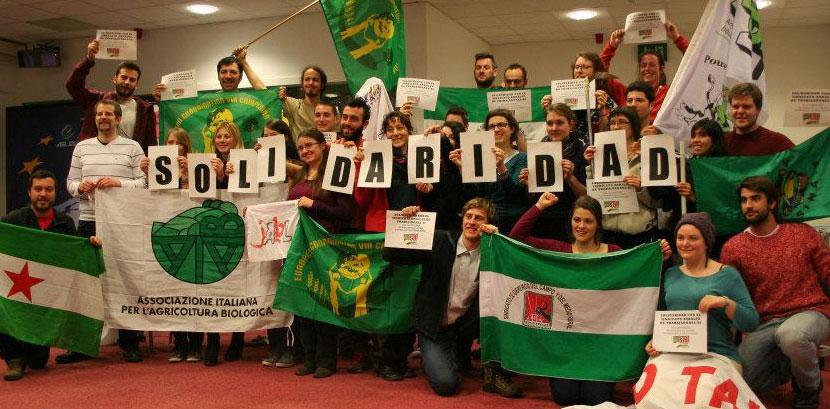Written by Anneke Rooth, Jongeren Milieu Actief (JMA)/ Young Friends of the Earth Netherlands, who represented Young Friends of the Earth Europe at a recent youth training on food sovereignty in Hungary, organised by Via Campesina.
Two weeks ago I had a lecture about the social exclusion of peasants (small scale farmers) and the social movements that developed from this in Latin America. Most of them are united in Via Campesina (the peasant route). One day later I got an email from Sophie (Young Friends of the Earth Europe), she was forwarding an invitation from the European Coordination Via Campesina (ECVC) with the question if I wanted to join their youth meeting in Budapest. This couldn’t be a coincidence! Especially taking into account the fact that although the training was already the following week, it was also the only week in the next half a year that I had no lectures or exams. So it didn’t took me long to say ‘yes’ (although my JMA’s new years resolution was to say ‘no’ more often).
So here I am writing this blog in the train from Budapest back home, still exhausted from this great week but with a big smile remembering all the funny, (Hungarian) dancing and moving moments I had with the group of 33 European farmers and activists. Regrettably also their shocking stories about fights for land, seeds and the big fight against the growing power of multinationals: The fight for food sovereignty in Europe.
This struggle for food sovereignty is super complex. It is not only about farming methods, it is about the right to choose the way you want to grow your food and therefore a whole range of issues is involved. This week we primarily talked about the right to have access to land, gender equality and migration issues, nevertheless my conclusion was that everything is involved. Also the right to live in a clean, healthy and sustainable environment as we are all trying to achieve.
These heavy discussions were all taking place in the youth center of the Council of Europe (not the European Council). This meant that we were having our own meeting room with an incredible view on Budapest’s skyline, rooms with beds that were made every day, food that was cooked 3 times a day and last but not least 6 interpreters which were translating everything simultaneously in English, French and Spanish. It took a while to adjust to these clarifying voices in my head but it was a brilliant new experience for me. It was actually necessary because a lot of the participants couldn’t speak English and my French is not very useful, not even talking about my Spanish (which could be my challenge for this year). These almost anonymous persons were even walking in the mud, manure and between all chickens for us when we were visiting Matthew’s farm 40 km away from Budapest. Thank you.
This visit was a welcome break from the inside discussions and for me very important because it connected me more to the issues we were actually talking about. It made me think of the great work I did in the community farm I was working last year and I realized that I shouldn’t only study on the policies concerning the human right to food but always keep the connection with farming myself.
Talking about policies, you all know the Common Agriculture Policy (CAP) of the European Union (EU) and the changes happening this year. Young Friends of the Earth Europe is doing an action on it, reCAP, but I want to raise your attention on the campaigns of my fellow participants: Henrik is involved in the ‘Go MAD’-action which encourages young people to meet one of their national European parliament members. ECVC, and the member organizations have also things going on concerning CAP. Ele is trying to organize CAP actions in the UK. Although all the other organizations are mostly working on a national or regional level, they are all heavily influenced by the outcome of the CAP reform so working together towards a fairer and more sustainable CAP is very important. Therefore I committed myself to a European CAP action and make sure we work together and help to create more united actions for a better European agricultural policy. This way we can make a strong statement and big demonstrations like the one we joined during the Green Week in Berlin are possible more often!
I want to thank Annelies for the invite, Sophie for forwarding it and ALL the other participants for teaching me a lot and the great fun we had together. Muchas gracias and see you soon!

